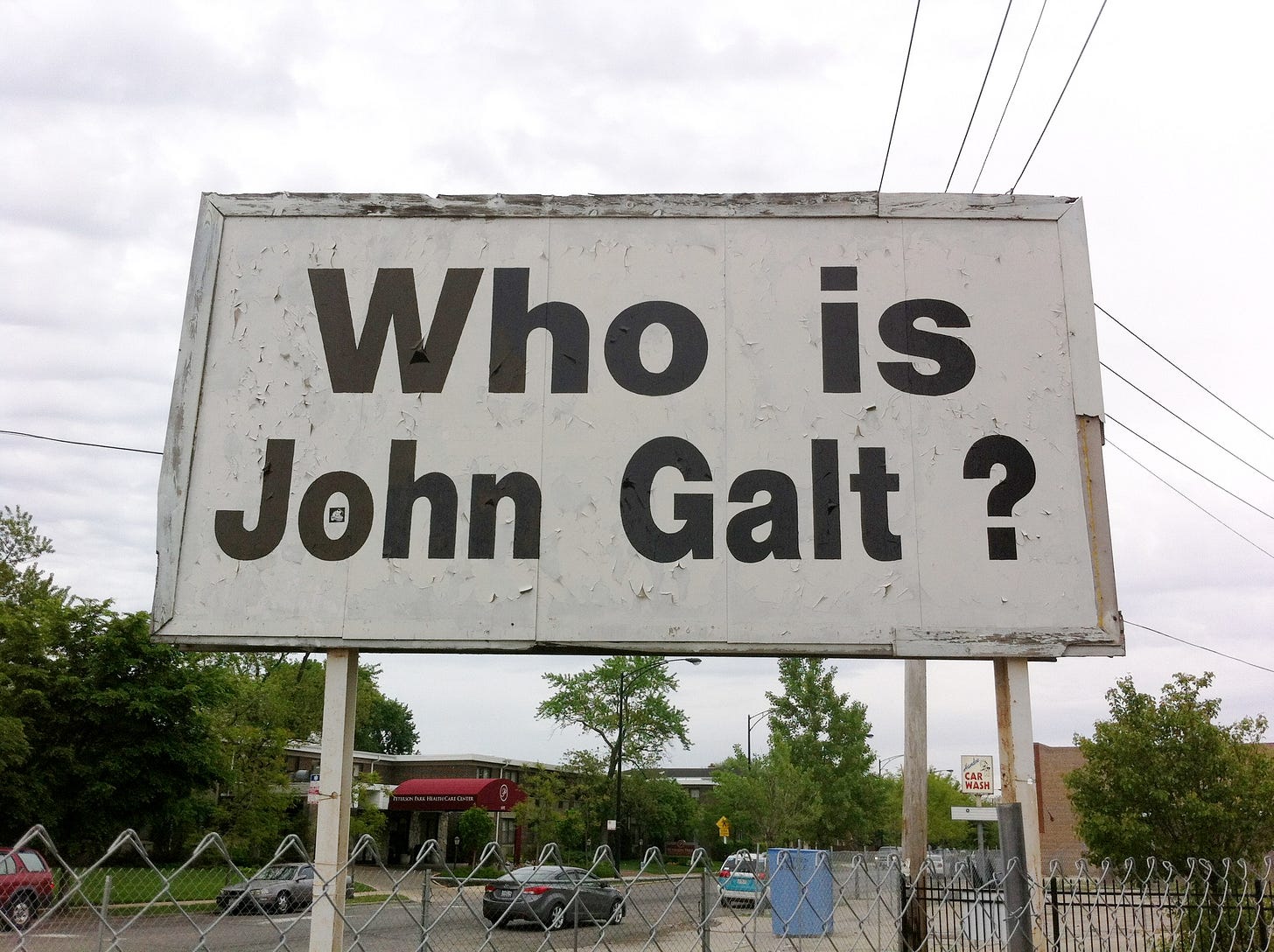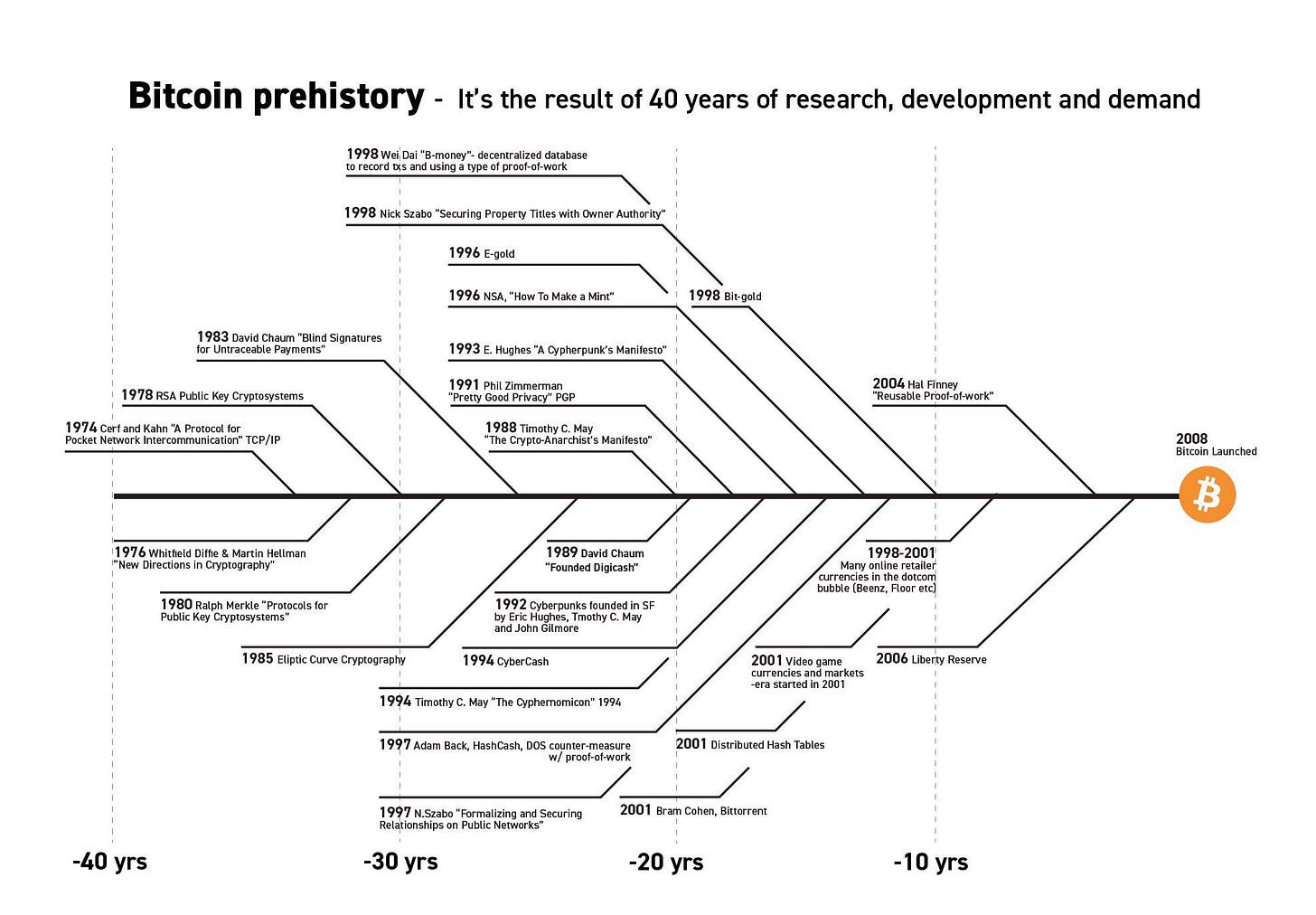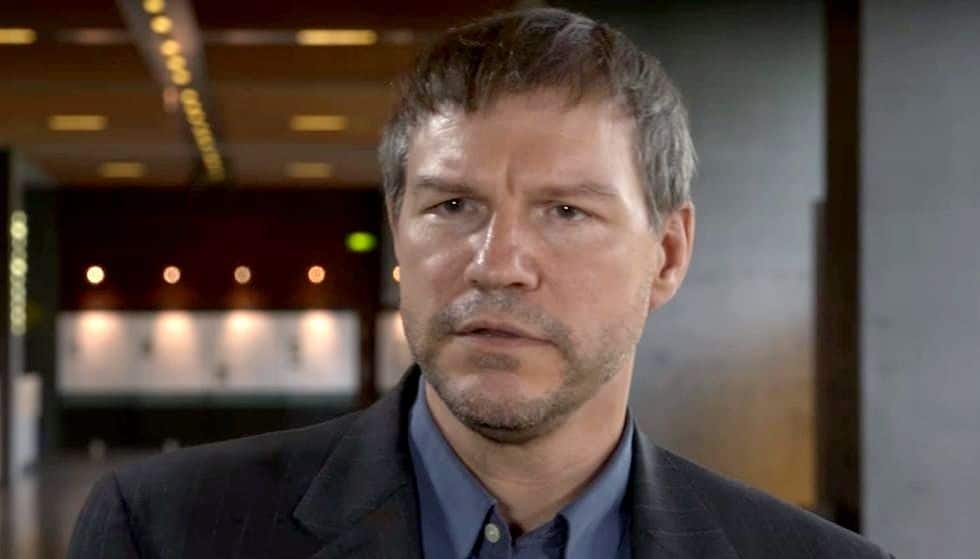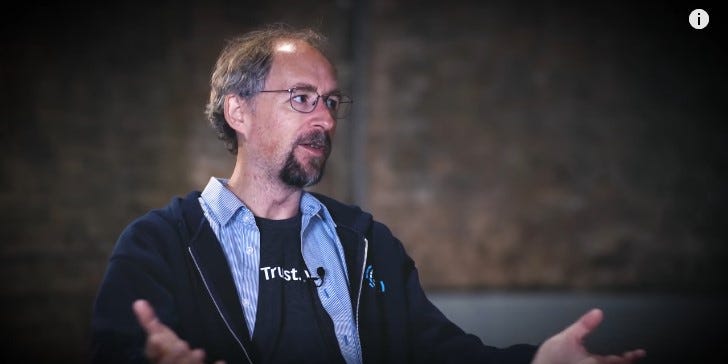[Deep Dive] Who is Satoshi Nakamoto?
The anonymous mathematician who shook the world
This is Something Interesting, an independent, ad-free roundup of interesting Bitcoin and economics news along with my commentary and perspective. If someone forwarded you this newsletter, you can get it for yourself by clicking here.
In this issue:
Who is Satoshi Nakamoto? (reader submitted)
What do we know about Satoshi?
Why did Satoshi hide his identity?
Who is definitely not Satoshi?
Who might be Satoshi?
Who is Satoshi Nakamoto?
“Who is Satoshi Nakamoto? Why are they anonymous? Does it matter?” - JC
On October 31, 2008 someone using the name Satoshi Nakamoto sent the first known copy of the Bitcoin whitepaper to a cypherpunk mailing list populated by a small handful of the world’s leading cryptographers. To most of us Bitcoin came out of nowhere but to the people in this community it was rooted in a long history of attempts to create digital cash: hashcash, bitgold, b-money, Chaumian eCash, etc. People had been working on this problem for decades.
The Bitcoin whitepaper builds on and cites many of these previous works, so it was a natural extension of the conversation. The community’s reaction at the time was mild interest, mostly skepticism. So many attempts to make digital cash had already failed that it was interesting to see another, but not all that exciting.
No one knew who Satoshi was - but that actually wasn’t uncommon in the cypherpunk community. People who devote their lives to cryptography tend to be sympathetic with the desire for privacy. Many members of the mailing list operated under pseudonyms. So it wasn’t suspicious but it also didn’t carry a lot of credibility. There was no reason to think this newcomer was going to succeed at building the perpetual motion machine that had eluded everyone else so far.
Satoshi waited a few months to gather feedback and then on January 9th 2009 launched the Bitcoin network as we know it. In those early days bitcoins were literally worthless - the only people playing with them were other folks from the cypherpunk mailing list. It would be May 20th 2010 before anyone used Bitcoin to actually buy something: 10,000 bitcoin for 2 Papa John’s pizzas.
For the entire first year of Bitcoin’s existence mining wasn’t a profitable thing to do but an altruistic one, helping to support the young network - and unsurprisingly the person who did the most to support the network during its infancy was Satoshi. Before he eventually stepped back to let the network support itself Satoshi mined over 1.1M bitcoin (~$35B at time of writing). They have never moved.
This is what people mean when they talk about Bitcoin having a fair launch. Satoshi didn’t give himself an extra cut or a head start for being the founder of Bitcoin. He gave everyone months of notice and never gave himself any special advantages. The reason he has more bitcoin than anyone else is simple: he believed in it the most. The fair launch is one of the most difficult aspects of Bitcoin for new cryptocurrencies to recreate: the market has lost its innocence. A year-long window for anyone to join before price discovery starts can never happen again.
So that is Satoshi Nakamoto: the anonymous mathematician who wrote a 9 page paper so clever it reshaped modern finance and made him a multibillionaire, if he ever bothers to collect his winnings.
What do we know about Satoshi?
Not very much. I am using he/him in this essay because those are the pronouns he used when he was still active in the community - he claimed to be a 37 year old man living in Japan, but there are some reasons to be skeptical. Satoshi communicated exclusively in English (quite fluently, with mostly British spellings and mannerisms) and his posting schedule implied that he was probably sleeping between 2pm-8pm Japan time. We don’t know Satoshi’s real gender or even if more than one person was contributing to the Satoshi persona. If it was one person they were a genius - Satoshi was an expert in cryptography, game theory, economics and programming.
Why did Satoshi hide his identity?
One simple reason is that Satoshi Nakamoto is unbelievably rich. At time of writing the Bitcoin attributed to Satoshi is enough to make him the 38th richest person in the world - only Satoshi’s wealth can be instantly and irrevocably stolen by anyone who gets access to his private keys. My personal opinion is that he likely destroyed the keys to those particular coins long ago - but even if he did it might be tough to convince a violent criminal he no longer has access to the passwords. If Satoshi’s identity became known he would probably be in immediate physical danger from criminals who would like $35B worth of unstoppable digital cash for themselves.
It’s not just criminals, though - Satoshi himself is a unique strategic resource. It’s likely if governments knew his identity they would want to seize him and compel him to work for them: perhaps trying to identify a weakness in Bitcoin, perhaps developing some kind of competitor, perhaps working on other cryptographic technology that governments are invested in developing or defeating. From the perspective of world governments Satoshi’s mind is a world-class economic weapon.
But his choice to stay anonymous was philosophical as well as pragmatic - a necessary part of the recipe for building what he wanted to build. Satoshi is undeniably the world’s leading expert in Bitcoin - if he ever advocated for a change to the Bitcoin network a large part of the market would likely trust his expertise and adopt the changes. But the whole point of Bitcoin is to eliminate trust. No one should be able to control Bitcoin - not even the founder. The trust the community has in Satoshi is a weapon that can be turned against it.
This is one of the key complaints about Ethereum - its founder (Vitalik Buterin) is well known. If Vladimir Putin decides he wants to install a backdoor in Ethereum he knows where to find Vitalik to … convince him … and because Vitalik is the founder he has the trust and influence to push changes through with less scrutiny.
To prevent this kind of attack Satoshi invented the Satoshi Nakamoto persona to inherit all the "founder trust" and then retired that persona to make sure that the Bitcoin network didn’t have a leader. If Putin wants to install a backdoor into Bitcoin there is no one to call up. That’s good for Satoshi (nobody wants that call) but it’s also good for Bitcoin - being leaderless makes Bitcoin harder to capture.
First, who is definitely not Satoshi?
Dorian Satoshi Nakamoto
This poor guy had the misfortune of being (a) named Satoshi Nakamoto and (b) utterly unaware of the Bitcoin phenomenon. Nakamoto is a retired physicist and programmer who did some classified military contracting work for the US government. For some reason Newsweek ran a front-cover article accusing him of being Satoshi Nakamoto - as far as I can tell the strongest evidence seems to have been his name. Nakamoto was briefly swarmed before it became pretty obvious to everyone involved that he was telling the truth when he said he didn’t know about Bitcoin and had nothing to do with it. Why would anyone go to the trouble of constructing a pseudonymous identity and then use their actual name? Totally embarrassing, Newsweek.
Craig Wright
Craig Wright is a fraudster associated with the BitcoinSV fork who is currently engaged in a wide ranging legal harassment campaign trying to bully the community into allowing him to assume the identity and legacy of Satoshi, primarily to lend credibility to his knock-off Bitcoin. You don’t need to know more about him other than that everything he says is a lie and everything he touches is a scam.
Who might be Satoshi?
The set of people who were seriously invested in the problem of digital cash was extremely small before Bitcoin attracted the world’s attention. It seems pretty likely that Satoshi was actually an alt account for someone else already active on the cypherpunk mailing list. Some of the more notable possibilities:
Hal Finney
Hal Finney was a cryptographer and computer scientist who developed rPOW - a precursor to the POW technique used by Bitcoin’s blockchain. He also was the first person besides Satoshi to adopt Bitcoin - the first to run the software, the first to file bug reports and submit improvements and the first ever to receive a bitcoin transaction. He also passed away from complications due to ALS in 2014, which could explain Satoshi’s silence and perfect discipline around his bitcoin holdings.
I personally think the odds that Finney knew (or eventually learned) who Satoshi was are pretty decent but I find the idea that he actually was Satoshi fairly unlikely. Going to all the effort of building up an alternate identity for the founder but then using your real identity to be the very first adopter feels incoherent. It would be like trying to avoid suspicion by pretending to discover your own crime scene. Satoshi was a meticulous planner who put a premium on good OpSec. I don’t think he would have made such an amateurish mistake.
Nick Szabo
“Myself, Wei Dai, and Hal Finney were the only people I know of who liked the idea (or in Dai's case his related idea) enough to pursue it to any significant extent until Nakamoto (assuming Nakamoto is not really Finney or Dai).” - Nick Szabo
Nick Szabo is the reclusive cryptographer and economist who created bitgold, one of the more direct ancestral precursors to Bitcoin. He has written extensively on the origins of money and the scalability of trust. He was one of the early (although not the earliest) adopters of Bitcoin and an active member of the cypherpunk community at the time. He has denied being Satoshi but he has been open about his practice of using pseudonymous identities at times. Some folks have used "stylometry" to argue that Szabo’s writing style matches that of Satoshi, though I find that to be a weak argument. Personally I think the odds that Szabo was part (or perhaps all) of Satoshi are pretty high. He has not just the right skillset but the right worldview.
Wei Dai
Another alumni of the cypherpunk community, Wei Dai is the cryptographer and computer scientist who created b-money - one of the early attempts at digital cash. The smallest unit of Bitcoin is called a satoshi - the smallest unit of Ethereum is called a wei. Wei was one of the first two people that Satoshi contacted about Bitcoin in 2008 before launch when it was still just a whitepaper - but he has downplayed his own influence on the project:
“My understanding is that … Satoshi Nakamoto didn't even read my article before reinventing the idea himself. He learned about it afterward and credited me in his paper. So my connection … is quite limited.” - Wei Dai
I don’t know much about Wei Dai so it’s hard to have a firm opinion about whether he could have been part of the Satoshi persona. He certainly has the relevant skills.
Adam Back
The other person that Satoshi reached out to in addition to Wei Dai was Adam Back, the creator of hashcash which Satoshi adapted into the Bitcoin mining algorithm. Like the others he was an active member of the cypherpunk community but unlike the others he was initially a skeptic of Bitcoin and expressed doubt the project would pan out. Today he is the CEO of Blockstream, the company that employs the largest number of Bitcoin Core developers.
Back definitely has the requisite experience and expertise in the space of cryptocurrency - and being initially skeptical but eventually warming up would be a good way to obscure your original involvement. On the other hand being such a public figure in the Bitcoin space is inviting people to wonder if you might be Satoshi. It just doesn’t seem worth it? There are so many ways to participate in/ benefit from Bitcoin without revealing your identity. Why risk the scrutiny? The case for Adam Back as Satoshi is reasonably popular but I personally don’t find it convincing.
Who do you think Satoshi is?











